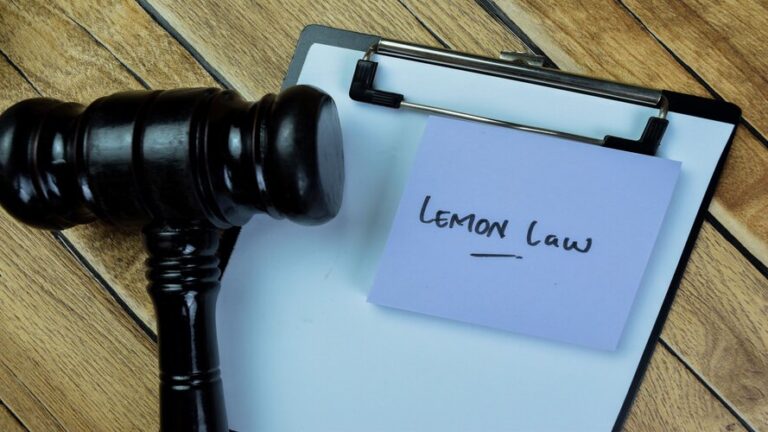Understanding the California Lemon Law
The California Lemon Law, officially known as the Song-Beverly Consumer Warranty Act, is a state law designed to protect consumers who purchase or lease defective vehicles. This law mandates that if a car manufacturer or dealer is unable to repair a vehicle after a reasonable number of attempts, the consumer is entitled to a replacement vehicle or a refund. The law covers new and used vehicles purchased or leased in California that are still under the manufacturer’s warranty.
The key components of the California Lemon Law include:
- The vehicle must have a substantial defect that affects its use, value, or safety.
- The manufacturer or dealer must have made multiple attempts to repair the defect.
- The vehicle must be covered by the manufacturer’s warranty when the defect is first reported.
Recognizing a Lemon Vehicle
A vehicle is considered a “lemon” if it has significant defects that impair its functionality and value. Common signs that your car might be a lemon include:
- Persistent mechanical issues despite multiple repair attempts.
- Safety hazards such as brake failure, engine problems, or electrical malfunctions.
- Frequent breakdowns that leave you stranded.
If you experience these issues and the manufacturer or dealer cannot fix them after a reasonable number of attempts, your vehicle may qualify as a lemon under California law.
Initial Steps to Take
If you suspect your vehicle is a lemon, follow these initial steps:
- Document Everything: Keep detailed records of all repairs, including dates, descriptions of the problems, and repair attempts. This documentation is crucial for building your case.
- Notify the Manufacturer: Inform the manufacturer of the persistent issues in writing. This creates a paper trail that demonstrates you have given them an opportunity to resolve the problem.
- Keep All Communication: Save all correspondence with the manufacturer and dealer, including emails, letters, and phone call logs.
By taking these steps, you strengthen your position when seeking relief under the California Lemon Law.
When to Consider Hiring a Lawyer
While some lemon law cases can be resolved without legal assistance, there are situations where hiring a California lemon law attorney is highly beneficial:
- Complex Cases: If your case involves intricate legal issues or disputes with the manufacturer, a lawyer can provide expert guidance.
- Manufacturer Denials: If the manufacturer denies your claim or refuses to offer a fair settlement, an attorney can advocate on your behalf.
- Stress Reduction: Handling a lemon law case can be stressful and time-consuming. A lawyer can manage the legal process, allowing you to focus on your daily life.
Hiring a California lemon law lawyer ensures that your case is handled professionally and increases your chances of a favorable outcome.
Choosing the Right Lemon Law Attorney
Selecting the right attorney is crucial for the success of your lemon law case. Consider the following factors:
- Experience: Look for an attorney with a proven track record in handling California lemon law cases. Experience with similar cases indicates that the lawyer is familiar with the nuances of lemon law and can effectively navigate the legal system.
- Reputation: Research the attorney’s reputation by reading reviews and testimonials from previous clients. A lawyer with positive feedback is more likely to provide quality representation.
- Communication: Choose an attorney who communicates clearly and promptly. You want someone who keeps you informed and responds to your questions in a timely manner.
- Fees: Understand the attorney’s fee structure. Many lemon law attorneys work on a contingency fee basis, meaning they only get paid if you win your case. Ensure you are comfortable with the fee arrangement before proceeding.
The Legal Process with a Lawyer
Once you hire a California lemon law attorney, they will guide you through the legal process, which typically includes the following steps:
- Case Evaluation: The attorney will review your case details, including repair records and communication with the manufacturer, to determine the strength of your claim.
- Filing a Claim: If your case is strong, the attorney will file a claim on your behalf. This may involve negotiating with the manufacturer or filing a lawsuit if necessary.
- Negotiation: The attorney will negotiate with the manufacturer to seek a fair settlement, which could include a replacement vehicle, a refund, or cash compensation.
- Litigation: If a settlement cannot be reached, the attorney will represent you in court. They will present evidence, call witnesses, and argue your case to secure a favorable verdict.
Success Stories and Case Studies
At Premier Legal Center, APC, we have successfully represented numerous clients in lemon law cases, securing substantial settlements and refunds. Here are a few examples:
- Case Study 1: A client purchased a new SUV that experienced repeated transmission issues. Despite multiple repair attempts, the problem persisted. We successfully negotiated a full refund for the client, allowing them to purchase a new vehicle.
- Case Study 2: Another client leased a car that developed severe electrical problems, causing safety concerns. The manufacturer initially denied the claim, but we filed a lawsuit and won a significant settlement for the client.
These success stories demonstrate our commitment to achieving the best possible outcomes for our clients.
Conclusion
If you believe your vehicle qualifies as a lemon under California law, it is essential to take prompt action and consider hiring a qualified attorney. At Premier Legal Center, APC, our experienced California lemon law attorneys are dedicated to helping consumers navigate the complexities of lemon law cases and secure the compensation they deserve. Schedule a free initial consultation and contact us at 619-235-0137 to discuss your case.

